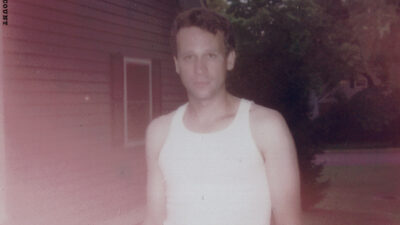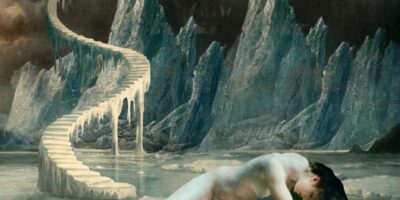This article previously appeared on Crossfader
Genre: Singer/Songwriter, Indie Folk
Favorite Tracks: “Tintin in Tibet,” “Earth,” “Crow Pt. 2”
True loss is inescapable and no matter how much distance can sand down the edges of grief, it holds on like a withered parasite. I lost my mother to cancer my senior year of high school, and while it’s been nearly five years, I still get bowled over whenever “Nightswimming” by R.E.M. comes on, or when I see a hummingbird. I see her everywhere, and while I didn’t lose my partner, or the mother of my child, I still feel intimately familiar with the topic of loss that’s prominently featured in Mount Eerie’s latest album, NOW ONLY.
Throughout NOW ONLY, Phil Elverum explores grief and the process of grieving a year-and-a-half after losing his wife. Elverum’s background, first with The Microphones and then with his most recent project, Mount Eerie, began based mostly around sound experiments. Avant-garde and sound-driven, the clear craft of his work is fueled by unadulterated poetry that asks “the big questions.” As Elverum put in an interview with Marc Maron: “Why we are here?” After his wife Geneviève passed away from pancreatic cancer in July 2016, Mount Eerie became something new. Elverum even addresses in his Maron interview that his former “big questions” felt like child’s play next to a thing like absolute loss. But his music was always poetry, and it would continue to be poetry in this new, post-mortem era of Mount Eerie and Phil Elverum—if not more so: in A CROW LOOKED AT ME, the first of the two albums released after her death, the music became entirely distilled poetry, backed up only by naked and raw accompaniment of the most stripped-down variety. Elverum was, after all, primed for this. There is a concept in the poetry world known as “writing in blood,” that to write poetry, you must be writing something that is a very part of your being, some small piece that needs to get out, to be expressed. Sometimes that need and urge comes before the event.
No more than five seconds into NOW ONLY, Elverum comes out in “Tintin in Tibet” and confirms the speculations most anyone who listened to A CROW LOOKED AT ME had: that album was not for us. It was for her alone, quite as much as NOW ONLY is primarily for him, and that voyeuristic feeling that accompanied A CROW stemmed from a collective audience observing a completely private moment that just happened to be in the public view. Although NOW ONLY is still a private moment, it feels less intrusive because of the transparency with which he shares it with us, removed one step from the naked event. While there is a distinction between the albums Mount Eerie released before and after his wife’s passing, there is also a clear movement between the two post-mortem records. A CROW LOOKED AT ME was grief incarnate: the literal and physical experience Elverum went through. NOW ONLY examines, explores, and questions that grief and the grieving process as a whole, and we see him begin to heal.
This healing is reflected in every song, lyrically and sonically. “Distortion” addresses his prior experiences with death and the concept of death, briefly taking the focus away from his wife and onto himself. He acknowledges the quietness of removal and time: losing the precise tone in the way she laughed or answered the phone, whether she even liked “Nightswimming,” yet, there is still light at the end of it all.
“Now Only” reflects the most directly on grieving and the conflict innate in whether or not the processes we take to recover do a disservice to the dead, or, for that matter, the collateral living. “Now Only” pairs a direct contemplation of touring with the last album and enjoying moments like jumping on beds, or staying up to the wee hours of the morning talking with Father John Misty, while also being painfully aware how exploitive he feels about singing songs of his dead wife to “a bunch of young people on drugs,” along with a chorus that lyrically and sonically questions the concept of grieving and loss. The song begins simple and sweet, and when the chorus kicks in, abruptly becomes upbeat, almost showtune-esque piano darkly underlying the ‘shit happens’ sentiment of, “People get cancer and die, people get hit by trucks and die . . . and some people have to survive and find a way to feel lucky to still be alive.” At first this feels jarring, but it reveals itself to be more darkly humored, nearly satirical while also genuinely inviting you to accept that bad things happen and that you have to keep living. “Majestic dead wife / As my grief becomes calcified, frozen in stories . . . And the feral eruptions of sobbing / These waves hit less frequently / They thin and then they are gone / You are gone and then your echo is gone / And the crying is gone.” He finally feels permitted to begin to heal.
Much as the chorus in “Now Only” had sonic references to healing, “Earth” is healing personified. As exposed and raw as A CROW sounds from its minimalistic accompaniment, “Earth” sounds produced and fully realized. Both sounds mirror the state of the man, and here, with the thrumming, coursing electric guitar and later a swell of aquatic white noise that adds a quiet turmoil, we feel the ache of a recovering man. Elapsed time numbs the sharp realities and the pieces of her bones in the yard have been bleached by the sun.
“Two Paintings by Nikolai Astrup” sounds like hope—reserved, almost resigned—but hope nonetheless. He gives us something to look forward to within the chord progression, underscoring his brooding lyrics. He contemplates the construct of life and death, the rushed feeling inherent at the end of a life: if he died suddenly, who would be left to examine the details in the last moments he’d lived? “I know the actual mess that death leaves behind / It just gets bulldozed in a panic by the living, pushed over the waterfall / Because that’s me now, holding all your things”—how grief lives in solid things. And the reality of death: that the living have to move on and you eventually fade from the memory of the ethos in moments like, “But sometimes people get killed before they get to finish . . . That’s why I’m not waiting around anymore . . . Does it even matter what we leave behind?”
Finally, we come to his closing song, “Crow Pt. 2,” which neatly ties back to his finale on the previous album, “Crow,” both in name and spirit. We return to his rumination of the wreckage left in the wake of death, the destruction of absence, the “ruins of [his] household,” and his daughter’s dream of a crow. However, this time around there is a refreshed awareness of how we regard the dead, and our relationship with them. “But in this child’s crow dream you survive / Beneath layers of magical symbolic wild animals / Inhabiting the edges of our fogged-over consciousnesses / Grasping for something to hold.” We keep the dead around in every crow or hummingbird we see, magical symbolic animals that become vessels for those lost. He reflects on the bitter sweet process of fading, how “every day that comes, the echo of you living here gets quieter” is both condemning relief and, at the same time, inexplicably terrible. Even as painful as remembering is, it’s all we have left of those we’ve lost, and even when it hurts, he grasps at the wisps of her memory: “Reaching through to the world of the gone with my hand empty.” Felt through every song on the album, NOW ONLY is the wound beginning to scab.
Many people use poetry to heal, and many people have no control over the poetry they are driven to write. Mount Eerie, whether intentional or not, employs poetry as a healing tool that was already in place before he knew he needed to use it. Although often conflicted over the creation of A CROW LOOKED AT ME, in hindsight fearing it was using tragedy as tool to make art, he really was following the process of healing art was affording him. In NOW ONLY, he moves from the proceedings of grief to processing it, and again, uses poetry and art as the medium with which he explores it. Loss and grief are inescapable in poetry; once you’ve experienced it, it clouds everything else out, screaming and demanding to be seen like a child in a grocery store. In the wake of loss, art feels trivial: “when real death walks into the house, all poetry is dumb.” Yet it is the inescapable mechanism through which Elverum needs to heal.
Verdict: Recommend















Comments